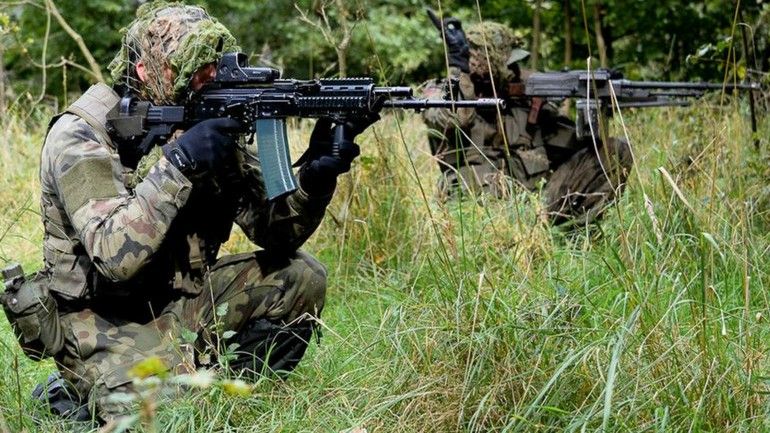Territorial Defence Forces
Poland: Less Money In The 2015 Defence Budget. Jach: Results Of The Backlog Created By The Former Government

The bill related to amendment of the 2015 budget, adopted by the government, assumes that the defence expenditure is going to be decreased, as the budget is going to face a reduction of PLN 200 million. The above means that the principle of allocating 1.95% of GDP to defence spending is not going to be pursued in line with the Act on Reconstruction, Technical Modernization and Financing of the Polish Armed Forces. Decreased expenditure results from the expenditure backlog, left by the previous government. This backlog is impossible to be rectified by the Ministry of Defence. It seems that the Ministry of Defence will be unable to get rid of the delays created by 10 months of actions executed by the previous coalition, hence, this amendment is required – as it was stated by MP Michał Jach, in an interview for Defence24.pl. Michał Jach, member of the “Law and Justice” party is the acting Chairman of the Parliamentary National Defence Commission.
According to the amended budgetary bill, PLN 32,815 billion is going to be used to finance the defence needs, in line with the Act on Reconstruction, Technical Modernization and Financing of the Polish Armed Forces. The amount is 200 million zlotys lower than it was originally planned. Let us recall the fact that this year, Polish defence expenditure, excluding the instalments related to the F-16 fighters, were to be contained in an amount of PLN 33,024 billion.
In Part 29 of the budget, “National Defence”, PLN 209 million reductions were imposed with PLN 95.2 million related to the property related expenditure and PLN 113.9 million covering the ongoing expenditure. The cuts were related to the social benefits (PLN 105 million), investment expenditure and investment purchases expenditure (PLN 41 million), budgetary grant covering financing or subsidy of the costs related to investment and procurement of the other units of the public finances sector, in an amount of PLN 53.3 million.
This step led to a situation, in which, throughout the year 2015, the rule contained in the Act on Reconstruction, Modernization and Financing of the Polish Army assuming that 1.95% of the previous year’s GDP is going to be allocated to the defence spending, is not going to remain in force. A relevant entering that abrogates application of that rule in 2015 was contained among so called proposed provisions and amendments to the realization of the budgetary act. Michał Jach (Law and Justice party), chairman of the Parliamentary National Defence Commission, noted in his interview with Defence24.pl, that due to the backlog left by the previous government, there are some concerns regarding the budget, which may not be realized even after a relevant amendment is introduced. The consent granted by the Minister of Defence, approving the reduction of budget, results from the expenditure backlog that did not make it possible to use all of the planned funds.
Not only is the decreased VAT income, being a general result of the budget amendment, also influencing the Ministry of Defence, a result of the Law and Justice party’s policy, but also of the policy pursued by the former coalition. At the same time, the policy pursued by the Ministry of Defence has been irrational, as it did not make it possible to use the planned funds to the fullest. Minister Macierewicz, during the first meeting of the National Defence Commission, stated that a large portion of the modernization expenditure has not been realized. Due to the scope of the backlog, left by the previous government, I am deeply concerned about the budget, which may not be fully implemented even after the amendment. Thus, Minister Macierewicz approved the idea of decreasing the expenditure, accepting the budgetary needs being a result of the lower VAT input.
Considering the scale of reduction of the planned expenditure, the contribution of the defence outlays to the GDP is going to be decreased to a value of ca. 1.93 – 1.94%. Cuts are hence limited, and 10 times lower than e.g. in 2013.
During the meeting of the National Defence Commission, Minister Macierewicz stated that the armament spending in this year, realized until mid-November, constituted no more than 60% of the planned expenditure. Thus, there is a serious threat that the Ministry of Defence is not going to utilize all of the assets allocated in the budget, even if one took into account the impact of the minor amendment introduced by the new government. The above status is burdening the former government.
MP Michał Jach notes, in his interview with Defence24.pl, that the Ministry is motivated to execute this year’s plan, within the scope of the expenditure. Last year, many of the modernization contracts (JASSM missiles, second Coastal Missile Squadron) were concluded in the last quarter of the year.
It is hard to tell, how the budget is going to look like, since increased number of invoices is always expected at the end of the year. I am willing to stress the fact that Minister Kownacki is intensively working on finalizing the assumptions related to this year’s modernization budget. The Ministry is determined to realize the plan, when it comes to the expenditure.
Decreased defence financing was a part of general amendment to the budget, resulting from the lower Value Added Tax income. Even if the above is not going to have a significant impact on the process, in which the modernization is being financed, providing – throughout the upcoming years – a proper funding for modernization and expansion of the Army, is still an open issue. The indicator, showing the GDP defence outlays, has been statutorily raised to 2%, starting from 2016. Further increase is also planned.
Both budgetary planning, in line with the assumptions, as well as implementation of the budget, are going to have a significant meaning. The opinion-makers show that, considering the current status of the army modernization process, it would be desirable to maintain the level of spending above 2% of GDP, which – in turn – makes it desirable to pay attention to the stability of the public finances, so that additional funds can be allocated for the defence purposes, even if the economic situation or the budget face some problems.
